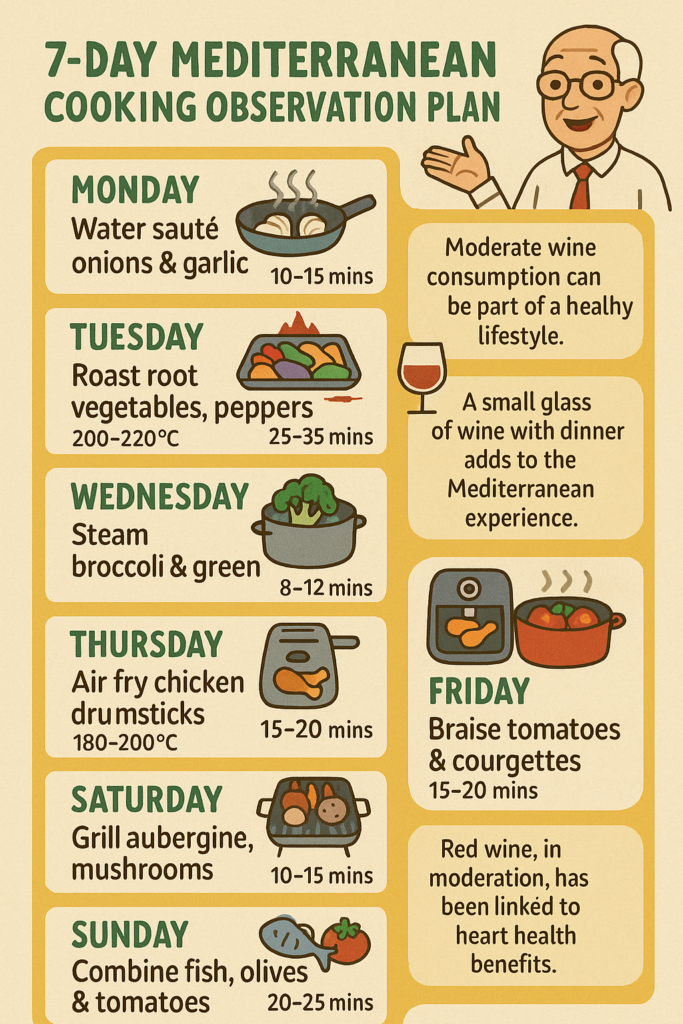Right, let’s talk about something near and dear to many of our hearts: that lovely glass of wine with dinner. One of the first questions I get asked when folks start thinking about the Mediterranean diet is, “Do I have to give up wine?” The answer, thankfully, is a resounding “no!” Let me tell you why.
- Wine, especially red, is part of the traditional Mediterranean lifestyle.
- Moderation is key: a small glass with meals.
- Focus on dry wines, lower in sugar.
- It’s about savouring, not overindulging.
- Think quality over quantity.
Quotables
- Moderate wine consumption can be part of a healthy lifestyle.
- A small glass of wine with dinner adds to the Mediterranean experience.
- Red wine, in moderation, has been linked to heart health benefits.
The Role of Wine in a True Mediterranean Lifestyle
Now, before we get carried away, it’s not a licence to open a bottle every night! The health perks linked to Mediterranean wine aren’t about excessive drinking. It’s all about how you enjoy it. Traditionally, wine is savoured with food, enhancing the meal, not as a standalone drink. It’s part of the social fabric, shared with friends and family, in moderation. This usually means around one small glass (125ml) for women and up to two for men per day—think of it as a gentle upper limit, not a target! Learn more about the social aspects of this diet. This context is just as crucial as the wine itself. You see, it’s all about that balance, isn’t it?
Red, White, or Rosé? Making the Healthiest Choice
When we discuss wine’s health benefits, we’re mainly talking about polyphenols, powerful antioxidants found in grape skins. Red wine takes the crown here, as it ferments with the skins. Resveratrol is the star polyphenol, linked to protecting blood vessels and boosting heart health. So, if health is your focus, a dry red is your winner. The Mayo Clinic has a good article on red wine and heart health. Look for reds naturally high in resveratrol, like Cannonau (Grenache from Sardinia – a personal favourite!), Pinot Noir (a lighter option packed with goodness), or Sangiovese (the heart of Chianti). What about white and rosé? While lower in polyphenols, a dry Pinot Grigio or Sauvignon Blanc is perfectly fine. “Dry” is the keyword – it means less residual sugar. And you can find some great information on common mistakes to avoid when starting the diet right here on our site.
What to Look For on the Label (Even in Tesco)
Don’t feel pressured to splurge at a wine shop – your local supermarket has plenty of Mediterranean-friendly gems! The NHS offers some great advice on alcohol types and units. Aim for lower alcohol content (11-13% ABV), often lighter and lower in calories. “Old World” origins (Italy, Southern France, Spain, Greece) usually mean a more food-friendly style, less overtly fruity or high in alcohol than some “New World” wines. Look for the grape names we’ve chatted about – Pinot Noir, Sangiovese, Grenache/Garnacha. A supermarket own-brand Chianti or Côtes du Rhône can be a real steal! You can also look at some brilliant Mediterranean baking swaps for a more holistic approach.
My Personal “Learned-It-the-Hard-Way” Wine Mistake
For years, I thought *any* red was “healthy.” I loved those big, jammy, high-alcohol (14.5%+) reds, but even one glass left me sluggish. It wasn’t until I travelled through Italy, experiencing their lighter, savoury wines, that I realised it’s about balance, not a flavour explosion. You can find more tips for simple swaps to lower cholesterol on a Mediterranean diet. Now I stick to lighter reds, no “day after” effects. It’s a lesson learned – sometimes the less obvious choice is the most rewarding.
Methods & Evidence — An Observation Plan
Here’s a simple 7-day plan I’ve developed to help you master oil-free Mediterranean cooking. Each day focuses on one technique, building your confidence gradually.
- Day 1 (Monday): Practice water sautéing with onions and garlic. Aim for 10-15 minutes cooking time.
- Day 2 (Tuesday): Try roasting vegetables at 200°C for 25-35 minutes until golden.
- Day 3 (Wednesday): Steam green vegetables for 4-6 minutes, then finish with lemon.
- Day 4 (Thursday): Use your air fryer at 180°C for 12-18 minutes for crispy results.
- Day 5 (Friday): Braise lentils or beans for 30-45 minutes until tender.
- Day 6 (Saturday): Grill vegetables on high heat for 3-5 minutes per side.
- Day 7 (Sunday): Combine techniques for a complete oil-free Mediterranean feast.
Illustrative Teaching Table
| Technique | Temperature Range | Typical Time | Best Foods | Flavour Tip |
|---|---|---|---|---|
| Water Sauté | Medium heat | 10-15 mins | Onions, garlic | Add splash of wine |
| Roasting | 200-220°C | 25-35 mins | Root veg, peppers | Balsamic finish |
| Steaming | 100°C | 4-8 mins | Greens, broccoli | Lemon & herbs |
| Air Frying | 180-200°C | 12-18 mins | Potatoes, tofu | Spritz with citrus |
| Braising | 160-180°C | 30-60 mins | Beans, lentils | Fresh herbs at end |
| Grilling | High heat | 3-5 mins/side | Aubergine, mushrooms | Marinate first |
| Non-stick | Medium-low | 5-10 mins | Eggs, fish | Build aromatics |

Sources
- British Heart Foundation – Mediterranean Diet Guidelines
- NHS Live Well – Healthy Eating Recommendations
- GOV.UK Food Standards Agency – Cooking Methods
Note: The cooking times and temperatures provided are educational examples only. Always adjust based on your specific equipment and ingredients.
Ultimately, the best wine is one you enjoy, in moderation, ideally with a delicious meal and good company. Check out these 15-minute skillet meals – perfect for a weeknight dinner with a glass of wine. Cheers to that!
FAQ: Your Wine Queries Answered
Does organic wine matter?
Well, that’s a good question! I tend to think of it like this: organic wine is made with grapes grown without synthetic pesticides and herbicides, which is brilliant for the environment. However, in terms of direct health benefits to *you*, the science is still a bit out on whether it makes a huge difference compared to conventionally grown grapes when it comes to wine.
Can I drink wine every day on this diet?
While a glass of wine with dinner is perfectly acceptable, remember it’s about moderation. I wouldn’t advise drinking wine every single day, simply because even small amounts of alcohol can add up over time. Some days a refreshing glass of water or herbal tea is just what the body needs!
What if I don’t like red wine?
Right, no problem at all! If red wine isn’t your cup of tea, a dry white or rosé is a perfectly fine alternative. Just be mindful of the sugar content—aim for “dry” wines. I sometimes love a crisp Sauvignon Blanc with fish – absolutely delicious!
Try it with some air-fryer fish for a quick, healthy meal.
Are there any non-alcoholic alternatives that fit the Mediterranean lifestyle?
Absolutely! Think of things like sparkling water with a squeeze of lemon or orange, herbal teas (especially those with Mediterranean herbs like mint or rosemary), or even diluted fruit juices. Getting creative with non-alcoholic drinks can be a lot of fun!
Check out these swaps to cut saturated fat for more ideas on incorporating healthy options into your diet.
What about sulfites in wine – are they bad?
Ah, the sulfite question! Sulfites are a preservative used in winemaking, and some people are sensitive to them, experiencing headaches. If this is you, look for wines labelled “low-sulfite” or “organic,” as these often contain fewer. But for most people, sulfites in moderation are not something to worry about.
